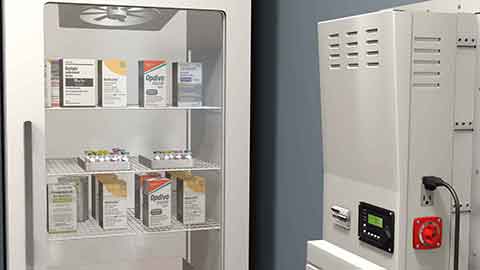Ensuring Continuity of Rheumatology Medication During Power Outages
For patients with rheumatic conditions, consistent access to their prescribed medications is crucial to effectively manage their symptoms and improve their quality of life. However, power outages can disrupt healthcare facilities and compromise the storage and accessibility of essential rheumatology medications. As medical professionals, it is our responsibility to ensure continuity of care, especially during emergencies. In this blog, we will explore the challenges posed by power outages in rheumatology medication management and highlight the significant role of battery backup power in safeguarding patient health by ensuring uninterrupted access to critical medications during such events.
Challenges During Power Outages
Power outages can occur due to a range of factors, from natural disasters like hurricanes or wildfires to technical malfunctions or grid failures. In healthcare settings, these disruptions can lead to adverse consequences, particularly in rheumatology medication management:
-
Temperature Fluctuations: Many rheumatology medications, especially biologics and DMARDs, require specific temperature ranges for storage. During power outages, refrigeration systems may fail, leading to temperature fluctuations that can compromise the potency and efficacy of these medications.
-
Medication Wastage: In the absence of a reliable power backup system, healthcare facilities might be forced to discard medications that were exposed to improper storage conditions during the outage, leading to unnecessary wastage and financial losses.
-
Patient Safety Concerns: For patients who depend on regular medication administration to manage their rheumatic conditions, power outages can raise safety concerns. Interruptions in medication delivery may lead to disease exacerbation or delayed symptom relief, impacting patient well-being and recovery.
The Role of Battery Backup Power
Battery backup power systems offer a practical and efficient solution to ensure continuity of rheumatology medication during power outages. Here's how they play a crucial role:
-
Uninterrupted Medication Storage: By providing continuous power supply to medication storage units, battery backup systems prevent temperature fluctuations and maintain the required conditions for storing sensitive medications. This preserves the integrity and potency of rheumatology drugs, ensuring they remain effective for patients.
-
Reliable Access to Patient Data: During power outages, electronic health records and medication administration systems may become inaccessible. Battery backup power ensures healthcare providers can continue to access vital patient information, treatment plans, and medication schedules, allowing them to make informed decisions and deliver appropriate care even during emergencies.
-
Enhanced Patient Safety: By preventing medication wastage and ensuring uninterrupted access to medications, battery backup power protects patient safety and prevents unnecessary disruptions in treatment. Patients can continue to receive their medications on time, reducing the risk of disease flare-ups and complications.
Conclusion
As medical professionals, it is imperative that we prioritize patient safety and continuity of care, especially during power outages. In rheumatology medication management, ensuring uninterrupted access to critical medications is vital for patients with chronic inflammatory conditions. By integrating battery backup power systems into healthcare facilities, we can overcome the challenges posed by power outages and safeguard patient health. These systems offer reliable and seamless power supply to medication storage units and essential medical equipment, protecting the efficacy and integrity of rheumatology medications. Embracing battery backup power technology is an essential step towards ensuring continuous and effective patient care, even in the face of unexpected emergencies.



